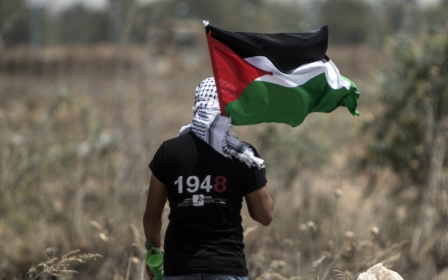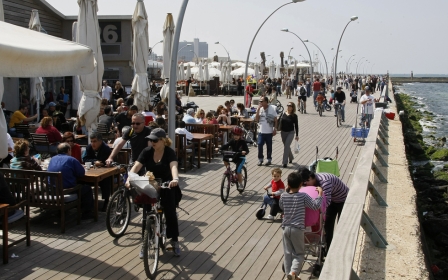Israel's systemic denial of Palestinians' right to water

Over the last few weeks, Palestinians have been facing severe water shortages because Mekorot, the Israeli water company, is denying or restricting their access to the resource.
The evidence suggests that the annual rainfall in Ramallah is higher than in London (619 mm/year compared to 596 mm/year). However, the Palestinian daily water consumption per capita (about 70 l/day) is strongly below the World Health Organisation’s recommendations (about 100 l/day). Meanwhile, Israelis consume on average about 250 l/day. How is such a drastic difference possible? What are the mechanisms that allow Israel to maintain this imbalance?
Fundamentally, this is not a typical water conflict. Contrary to other situations across the globe, and to what we often hear or might think, there is enough water for everyone in the region. This means that the problem is not hydrogeological or geographical, nor technical, but mainly political. And not only is it political, but it is consciously used by Israel “as a tool of warfare”, of which repercussions are manifold.
Therefore, the problem doesn’t lie in the lack of water resources in Palestine, but rather in the impossibility for the Palestinians to access them, because Israel considers itself to have priority over them, as a direct manifestation of its military occupation of the Palestinian lands and natural resources.
Since water from the basins of the occupied West Bank naturally flows down to lands lying at a lower altitude, it is enough for the latter to prevent the Palestinians from extracting the water to get full control. This is done either administratively – by denying authorisation to drill wells, often without justification – or physically – by destroying existing infrastructure or not taking care of it. The Israelis help themselves generously, and then sell back to “their neighbours” what is left of the “stolen” resource, choosing its price and amount.
Is this legal? No. Nor is it secret, since the targeting of water resources for example has been recognised by UN reports as “deliberate and systematic”. This, of course, is contrary to international law, according to which access to water and sanitation is a human right, and preventing it is a war crime. Indeed, Israel has the obligation to ensure an “equitable and reasonable allocation of resources” as an occupying power.
The problem here is twofold. On the one hand, borders are not clearly defined, and Israel systematically blurs the lines with its illegal settlements and expansion on the ground, that have nothing to do with official maps. As a consequence, it is hard to argue in favour of Palestinian territories following international law, because these territories are not precisely defined.
But what is perhaps more problematic, because it is very paradoxical, is the fact that the issue has been addressed in the Oslo agreements. These norms are unfortunately not clear enough. They were only supposed to constitute a mere framework, meant to lead to further, more precise legislation. Yet the Palestinians are still waiting for those “final status negotiations”, and in the meantime, are left with an imprecise legal norm that recognises, and therefore enforces the status quo, which includes the denial of accessing their natural resources including water.
That said, various specific committees (as the Joint Water Committee) have been set up, which is slowing down the process, because there are now too many actors involved in the water sector. This results in a scattering of responsibilities inside Palestine. Even among those organisations, Israel is still much more powerful, since it benefits from a right of veto. It is also the case in the asymmetrical weight of Palestine and Israel in the issue, as the latter benefits from three levels of veto in the Joint Water Committee. So, in a nutshell, “the occupied territories today are both besieged and internally fragmented”.
Donors reinforce Israeli dominance
What about the international community? There is no regional coordination, and countries neighbouring Palestine all have different water policies and political agendas, which doesn’t help. Same for the huge number of different international organisations and NGOs involved in region.
Everybody agrees that Israel has no right to act like it does. Billions of dollars of aid are sent each year by foreign donors. But unfortunately, the water sector as a whole seriously lacks coordination, and, in the long term, the presence of foreign donors mainly reinforces fragmentation and corruption. Donors end up perpetuating the status quo and approving Israel’s action.
Since the situation is labelled as “an emergency”, it incites international actors to focus on the consequences of the problem with short-term interventions, while ignoring its roots and more durable investment. External intervention thus work on filling up a gap that might precisely serve as a catalyser.
The consequences of what precedes are quite wide-ranging. The lack of water for everyday needs can obviously affect health – but Israel’s stranglehold on this resource is also economically meaningful, since its cost and scarcity make it difficult for the Palestinians to develop their agriculture, not to mention any kind of industry. Even cultural goods, such as historic cisterns or springs, are damaged by Israeli targeting. As a result, the Palestinians are forced to depend more on Israel, to get water, food, industrial goods or jobs. The NGOs and international structures involved in the sector simply reinforce this vicious circle.
Consequently, water is a very powerful tool. Controlling it enables the Israelis to throw many aspects of the Palestinians’ life off balance, without much effort. All they have to do is turn off the tap.
These man-made shortages might well soon lead to real shortages due to over-extraction, pollution, and bad management of existing resources. In the end, this affects the people’s relationship with their country, and drives them off their lands in search of water or a better life, since they are stuck between too many actors and interests that are not theirs. Water is only one among other elements in such a process, but it is a very fundamental one.
Therefore, international donors invest a lot into technical projects, but focusing only on them is ineffective, especially from a long-term perspective. This is not to say that technical improvements are not necessary, but rather to underline that they cannot precede nor replace a political solution. The latter should be global, and realistic.
Israel must be held accountable for its systematic violations of human rights and international law, which means that more advocacy is needed both locally and internationally. The international community is responsible for helping the Palestinians to claim their rights.
This would somehow rebalance the situation, and open the door to more equitable deals. But as long as Israel’s supremacy and control of water resources remain unchallenged, change seems unlikely, no matter how many billions of dollars are spent on technical solutions each year. Building pipes, even with the best intentions and Western technologies, won’t make water flow in them.
The lack of water in the occupied Palestinian territories is not of a technical, hydrogeological nature, but it is a “politically generated drought”. To address this reality, each actor should start by reassessing the general circumstances of the problem, in order to understand it globally. Only this will allow them to improve anything by dealing with its roots, and not exclusively with its consequences. Any other approach is a delusion and a waste of time.
- Clara Skupien is a graduate student in International History at the Graduate Institute of International Studies and Development (IHEID) in Geneva, Switzerland.
The views expressed in this article belong to the author and do not necessarily reflect the editorial policy of Middle East Eye.
Photo: A Palestinian man carries a jerrican he filled with spring water on 23 June, 2016 in Salfit, north of Ramallah, where some of the West Bank village's inhabitants have been without water for days (AFP).
This article is available in French on Middle East Eye French edition.
Middle East Eye propose une couverture et une analyse indépendantes et incomparables du Moyen-Orient, de l’Afrique du Nord et d’autres régions du monde. Pour en savoir plus sur la reprise de ce contenu et les frais qui s’appliquent, veuillez remplir ce formulaire [en anglais]. Pour en savoir plus sur MEE, cliquez ici [en anglais].





